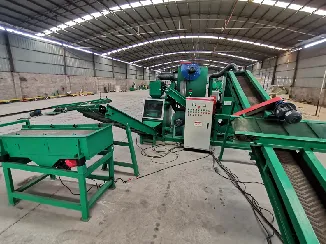

ное. . 08, 2024 21:26 Back to list
The Importance of Electronic Waste Crusher in Modern Recycling
In an age of rapid technological advancement, electronic devices have become integral to our daily lives. However, as these devices become obsolete and are replaced by newer models, they contribute to a growing problem electronic waste, or e-waste. E-waste comprises discarded electronic devices, which can be detrimental to the environment and human health if not disposed of properly. One of the most effective solutions to tackle this issue is the electronic waste crusher, a vital component in the recycling process.
Understanding Electronic Waste
Electronic waste includes a wide range of products such as computers, televisions, smartphones, and household appliances. According to the Global E-Waste Monitor, the world produced a staggering 53.6 million metric tons of e-waste in 2019, a number that continues to rise annually. These discarded devices contain hazardous materials including lead, mercury, and cadmium, which can leach into the soil and groundwater, contaminating the ecosystem. Proper disposal and recycling methods are crucial to mitigate these risks.
Role of Electronic Waste Crushers
An electronic waste crusher is a machine specifically designed to break down and shred electronic components into smaller pieces, facilitating the recycling process. By reducing the size of e-waste, these crushers make it easier to separate valuable metals and materials from non-recyclable components, leading to a more efficient recycling operation.
The primary purpose of electronic waste crushers is twofold to protect the environment by ensuring that hazardous materials are disposed of correctly and to recover valuable resources. Precious metals like gold, silver, and copper are commonly found in electronic devices and can be recycled and reused. By extracting these materials, electronic waste crushers contribute significantly to resource conservation and sustainability efforts.
Environmental Impact
The importance of electronic waste crushers extends beyond just processing e-waste. By effectively managing electronic waste, we can significantly reduce landfill usage and the associated environmental impacts. Landfills are often overloaded with garbage, and when e-waste is disposed of in this manner, it can take years to decompose, all while releasing toxic substances into the environment.

Furthermore, the recycling process facilitated by electronic waste crushers reduces the need for mining and refining new raw materials, which are energy-intensive and environmentally damaging processes. By recovering materials from e-waste, we not only conserve natural resources but also decrease greenhouse gas emissions associated with material extraction and processing.
Economic Benefits
In addition to environmental considerations, electronic waste crushers also offer economic advantages. The recycling industry creates jobs and generates income through resource recovery. As the demand for raw materials fluctuates, a thriving recycling sector can stabilize prices and provide a sustainable supply chain for industries reliant on these resources.
Moreover, investing in electronic waste recycling facilities equipped with efficient crushers can be a profitable business. Companies can turn e-waste into a valuable commodity instead of viewing it as a cost burden. This shift in perspective is crucial for encouraging more businesses and individuals to participate in responsible e-waste recycling.
Challenges and Future Directions
Despite their benefits, electronic waste crushers face challenges. One of the main issues is the safe handling of hazardous materials. Proper training and safety protocols must be established to protect workers involved in e-waste recycling. Additionally, as technology evolves, the types of electronics being disposed of will continue to change, requiring continuous adaptation from recycling facilities.
Education and awareness are key components in the successful implementation of electronic waste recycling programs. Both consumers and businesses need to understand the importance of proper e-waste disposal and the role that recycling plays in protecting the environment and conserving resources.
Conclusion
In conclusion, electronic waste crushers play a vital role in managing the growing problem of e-waste. By effectively processing discarded electronics, we can mitigate environmental risks, conserve valuable resources, and support economic growth through the recycling industry. As we continue to develop new technologies, the importance of efficient e-waste management will only increase. It is imperative that we invest in and promote the use of electronic waste crushers as part of a broader strategy for a sustainable future. By doing so, we can turn the challenge of e-waste into an opportunity for positive change.
Latest news
Troubleshooting Common Eddy Separator Problems
NewsJul.04,2025
The Role of Metal Recycling Plants in Circular Economy
NewsJul.04,2025
The Impact of Recycling Line Pickers on Waste Management Costs
NewsJul.04,2025
Safety Features Every Metal Shredder Should Have
NewsJul.04,2025
How Industrial Shredders Improve Waste Management Systems
NewsJul.04,2025
How Cable Granulators Contribute to Sustainable Recycling
NewsJul.04,2025